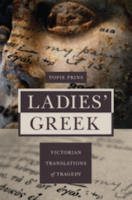
Princeton (2017) p/b 297pp £24.95 (ISBN 0691141894)
Inspired by material garnered from manuscripts, marginalia and old magazines in archives, libraries and special collections, this book traces the history of women’s increasing intellectual empowerment during the nineteenth and early twentieth centuries through their study of, and engagement with, classical Greek and provides a refreshing complement to the scholarly publications of male Hellenists in the Victorian period. Far from being excluded from this most masculine-seeming of domains, intellectual women embraced their limited opportunities of pursuing a love affair with Greek, with all its attendant pleasures and pains, as a means of proving themselves capable of rational thought in a fast-changing world.
P. sensitively explores how and why women learned to read the Greek alphabet and how their encounters with the language and their increased confidence in mastering its complexities as well as, if not better than, men enabled them to articulate the plight of nineteenth century women, campaign for female emancipation and employ the cultural prestige of Greek to support their campaign for higher education, thus leading directly to the founding of women’s university colleges in both England and America.
The inclusion of numerous photographs and illustrations allows us actually to see the spindly letters of thirteen-year-old Elizabeth Barrett’s ‘lady’s Greek/ Without the accents’ in her ‘First Greek Ode To Summer’, written on May 4th 1819 and proudly preserved in her mother’s commonplace book, or Virginia Woolf’s Agamemnon notebook of c. 1922 with Greek text on the right side of the page and English translation on the left (p.36).
But it is not only the engagement with classical Greek of famous female writers like George Eliot that is documented in this book, but also that of a galaxy of less well-known enthusiasts like Janet Case, publishing her translation of Prometheus Bound to spread the idea of revolt against tyranny to the working classes, or Annie Adams Fields fund-raising for the new women’s colleges in Boston literary salons, or Edith Hamilton creating a vision of ‘The Greek Way’ for 20th century American democracy.
We attend women’s first amateur collegiate performances of Sophocles’ Electra—at Girton College in 1883 and at Smith College in 1889—which helped pave the way for modern professional performances. We read lines of Agnes Robinson’s and Hilda Doolittle’s translations of Euripides’ Hippolytus into contemporary verse, showing how women in the 1870s, now less dependent on their male relatives to learn Greek, gave voice to greater independence of mind and, by transposing the language of male into female desire, discovered new forms of female sexuality and friendship and opened up fresh avenues for the transformation of English poetry. We even see choruses of Euripides’ Bacchae demonstrating the mobility of the ‘New Woman’, as reflected in the fashion for eurhythmics and the ‘Bacchic shiver’ of Isadora Duncan, transforming the static poses of Emma Hamilton’s Attitudes and Delsartism into the dynamic choreography of Eva Palmer’s maenads at Smith College and Bryn Mawr.
Battling their great educational disadvantages and consequent insecurity in their own achievements, women are shown transcribing, transliterating and translating Greek, hammering out their own literary compositions, acting in experimental play performances, forming networks for literary and cultural exchanges across the Atlantic and, as passionate amateurs rather than classical scholars, promoting the popular reception of Greek tragedy to a wider audience in the early twentieth century.
This book is important reading for every one of us who claim knowledge of, or interest in, Greek letters. It is a lens through which we may examine not only Victorian women’s engagement with classical Greek, but our own motives for learning and teaching this language too.
Claire Gruzelier
